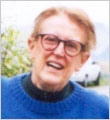|
HOME |
|
|
 |
Some thoughts on writing ... |
|
HOME |
|
|
 |
Some thoughts on writing ... |
Read what Margaret Mahy has to say about writing.
Where do I get ideas from?
My ideas mostly come from things that happen to me, but of course they are changed a great deal by the time the story is finished. The ideas begin with real things but I invent all sorts of things to add to them, or I change them in some way before the story is finished.
How do I do research?
I seldom do a story that requires a great deal of research, but when I do, I do it more or less at the same time that I write, and I also read books and listen to music that helps me to maintain a particular mood. As I have a very large number of books, most research I need to do is around me, but on occasions I have rung the police, the coroner's office, the St John's Ambulance Service and, of course, the library, looking for details which will add a bit of reality to my stories.
How do you get your characters?
I When I have an idea properly established I think of it all the time . . . driving, gardening, shopping . . . sometimes the story becomes so interesting to me that real life becomes rather shadowy for a while. In effect I have to abandon my own life to let the life of the story take over.
I think hard about the characters, partly inventing them, but also using pieces of many people I know. Apart from Sophie in Memory I don't think I have ever based a character on any one I know, but I use incidents from my own life all the time. They seem to fit with fictional lives very well. I think most of the stories I write are suggested by some sort of incident and this, in turn, suggests the characters who might be involved. .
How do you find out what children like to read?
I don't ask children what stories they like or want. I think I have a good memory of the sort of stories I enjoyed, and in the beginning I am writing for the sort of listener I was when I was a child. In the beginning the author is not only the writer of the story, but the reader too. I don't brainstorm with anyone else except myself.
Letters from readers
I get a lot of letters from schools, many of which have been stimulated by a language programme. Some children write without prompting however. I try to answer them all, but I am often late with them. Even with a word processor, it takes a long time, and sometimes, where a school project is concerned, there are many questions. Some people are very unreasonable in what they expect. All the same I try to answer their letters.
Some people have said that they hated my books, usually because of the supernatural elements in them. What can one say? I am sorry and feel a bit guilty because I want people to enjoy reading what I write, but I also want the freedom as a reader to dislike certain books written with every bit as much sincerity as mine. People like different books and so they should.
How do you go about writing?
I almost never get stories right at first draft stage unless they are very short indeed. I don't worry about spelling, grammar or punctuation, although I think it is important to know about all these things since without them a story becomes too difficult to follow, and there is no sense in writing a story in which the reader will be continually hesitating, wondering just what is going on. I correct a lot of mistakes I make at a later stage.
I sit down at my word processor and begin work, get something down and then leave it for twenty four hours. If I am working in long hand, I write on every second line so that there will be room for corrections which I do in ink of a contrasting colour, so that scribbles and tiny printing will be easier to read.
I write best in or around my home, and I think I write best during the day, though for many years I used to write late at night, sometimes all night. However I am older now and get tired more easily, and, being a full time writer I have time during the day.
I try to get started by 9am each day, and ideally, I should begin by going over what I did the day before. I often find I improve yesterday's work a great deal and get new ideas
I always revise, and often do at least four drafts of a story, sometimes more. While revising, I think about the way the story flows (how smoothly and at what pace) and try to think about the way it sounds, even if it is a long story which might not ever be read aloud. I do use a thesaurus and a dictionary as I work, very frequently in the middle of the revision process, but much less as I get towards completion.
I suppose it takes about a year for a book to be published ... more if one has to waitfor an illustrator to make room for it in his or her work programme.
Carry on and hear the answers she made to questions asked by children.